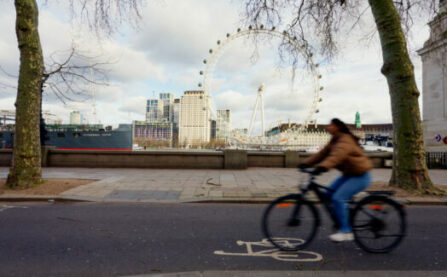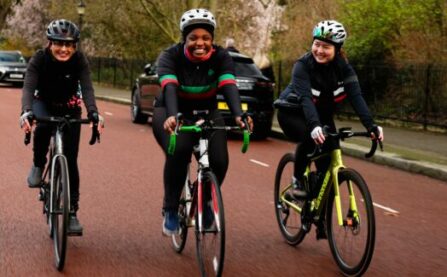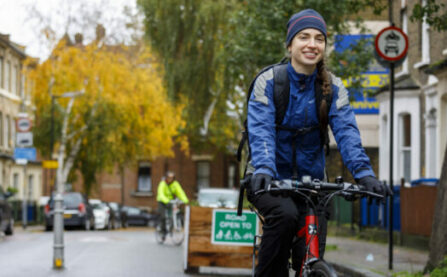

Westminster City Council has announced £60m plans for Oxford Street & area. But while the broadly good news is that the new council in charge of Westminster is taking cycling seriously elsewhere in the borough, it isn’t here. Worse news – the proposals won’t just fail to make cycling easier for the 4,500 trips per day already happening on Oxford Street – they risk making it even harder.
Oxford Street is one of the highest priority potential cycle routes in London, according to Transport for London data. Tell Westminster their plans to do less than nothing for cycling on this iconic street are not good enough!
The consultation closes on 31 August. Below is some of the key issues we’re going to raise. Click here to send your own response in today.
Be warned – the consultation has a long list of questions with only one opportunity to write your comments right at the end. Please respond now – or read on for more detail.
It’s better for pedestrians – the proposals would improve walking on Oxford Street somewhat, with wider pavements, a narrower carriageway (although removing the horrible central reservation will make crossing the road less easy for some people), three new signalised pedestrian crossings, and Oxford Circus simplified for crossing on foot, with an extra 40% of pavement space added to this junction. Two side roads would become cul-de-sacs, and James Street and Davies Street made into traffic-free public spaces.
There are some welcome proposals for north-south cycling links across Oxford Street, like James Street / Gilbert Street. But the only proposals to benefit cycling on Oxford Street itself would be adding advanced stop lines (bike boxes) to junctions ‘where possible’. Other proposals could actually make it harder for cycling than it already is. The new traffic lanes would be 3.25 metres wide each way, which borders on the 3.25 to 4m width that TfL and DfT say to avoid, where drivers and cyclists could be tempted to overtake one another without enough room to do so safely.
At Oxford Circus, both vehicles and cycles would have to go straight ahead, with all turns banned. While in theory this would benefit pedestrians, without a clear alternative route many people cycling will simply continue to turn across this junction, creating conflict with people on foot. Regent Street does have cycle lanes, inadequate though they are, and carries about 1,000 cycle trips per day – so banning turns between Regent Street and Oxford Street by bike makes no sense at all. A better option would be to allow two-stage turns for bikes at this junctions.
Finally, the proposals aim to remove cycle parking from Oxford Street and relocate it on side streets, to ‘reduce clutter’. Isn’t it hard enough to park a bike in the West End already?
The consultation says they are developing a “high-quality parallel east-west cycle route between Marylebone and the West End” – but one alternative cycle route, however good, doesn’t begin to cut it. Transport for London’s latest ‘Strategic Cycling Analysis’ shows not one, but four, priority cycle routes going east-west across the area. These align with Wigmore Street to the north and Brook Street and Piccadilly to the south approximately, as well as Oxford Street itself. There is huge potential here for many thousands of journeys per day to switch from motorised transport to cycling says TfL – and we are in a climate crisis. But that will not happen with one wiggly route at a significant distance from Oxford Street.

TfL’s Strategic Cycling Analysis showing priority cycle routes (see p.33 of the new Cycling Action Plan)
Oxford Street already carries 4,500 cycles a day, despite zero cycle infrastructure, thanks to being such a straight, direct east-west route. It’s not going to stop being used for cycling anytime soon. This calls for better measures, especially given that 19 people have been seriously injured cycling on Oxford Street in the last five years we have data for.
If so many people cycle there now, how many more would be enabled to cycle if it was a safe, protected cycleway, joined up to a wider network? It could link into the Park Lane and Cycleway 3 tracks at the western end, and to Camden’s cycle network at the eastern end. The old Westminster City Council was famously anti-cycling – the new administration needs to make sure that legacy does not linger on in this inherited scheme.
Indeed, Westminster City Council is currently set to put £60m into this scheme that does ultimately some good for pedestrians, but nowhere near enough compared to TfL’s 2017 plans to pedestrianise the shopping hub, and nowhere near good enough for buses, or cycling, or traders. This is an expensive scheme that isn’t bold enough for anyone.
For such an expensive scheme, it’s not going to produce much bang for its buck in terms of reducing traffic. On Oxford Street itself there are some new or extended restrictions on general motor vehicles – but taxis continue to be exempt. New taxi ranks will provide 60 additional spaces, so taxis are still going to feature heavily in the make-up of traffic for little clear or good reason.
For the neighbourhoods north and south of Oxford Street, only the plans for North Mayfair (reversing the direction on two roads) mention motor traffic reduction, while plans for Marylebone and Fitzrovia to make Wigmore and Margaret streets two-way aim to reduce traffic speed and domination, but there is no mention of less motor traffic overall. There are even plans for more parking spaces – surely a step in the wrong direction?
Westminster only needs to look at its neighbour. Camden’s successful ‘West End Project has reduced traffic, made cycling safer and improved air quality, both on Tottenham Court Road and Gower Street – now much safer for walking and cycling – and in neighbourhoods like Seven Dials.
Do you live in Westminster, or cycle through or to it regularly? Our local group could always do with more help to make a difference – find out more and sign up to their newsletter below.
More news

London Loves Cycling, wrapped up
Voting for the London 2024 Mayoral election has closed. While we wait to find out who is London's next Mayor, what did our campaign achieve?
Read more

Mayoral candidate responses: London Loves Cycling
What have the candidates for Mayor of London said in response to the #LondonLovesCycling campaign?
Read more

Londoners share love of cycling
Hundreds of stories from Londoners across the capital about why you love cycling
Read more

Government report shows LTN popularity
The UK government has published its review of Low Traffic Neighbourhood's, announcing a "crackdown", despite its own report loving them…
Read more
Activists in the City of Westminster are working hard to make a difference - they won pledges for active travel from the new council at the local elections. Can you help them go further, faster? Sign up to the local borough newsletter to stay in touch.